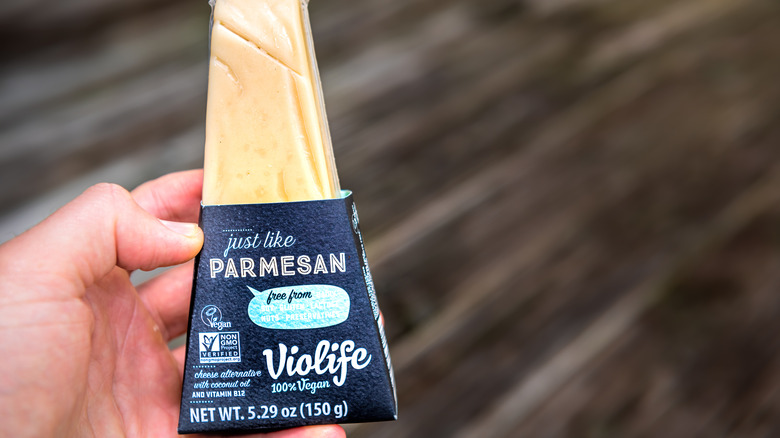Why Vegetarians Should Avoid This Popular Italian Cheese
While you won't ever find me turning away a juicy, tempered steak, I sympathize with those who have decided to abstain from meat because, for them, finding quality sources of protein can sometimes be challenging. For many vegetarians, this is where cheese comes to the rescue. The creamy hero of pizza, nachos, and cheesecake is an appetizing way to get a boost of the essential macronutrient. Yet, unfortunately, there are some popular cheeses that aren't vegetarian-friendly.
If you order a pasta dish from an upscale restaurant loaded with Parmigiano Reggiano, your meal is decidedly not vegetarian. There are remarkably stringent guidelines regarding what can be dubbed Parmigiano Reggiano, and you can only know you have a genuine Italian wedge by seeing a Protected Designation of Origin (PDO) label on the package. That indicates the cheese was made in specific regions of Italy with only three ingredients: unpasteurized milk, salt, and rennet.
Rennet is where vegetarians will have a beef with Parmigiano Reggiano. The enzymes found in rennet act as a coagulant for the milk, which is what separates the curds from the whey. It is key to achieving that distinct, rigid texture in many hard cheeses, but it is sourced from the lining of a cow's stomach. It is part of the animal and, therefore, a notable offender of a true vegetarian diet. Because the process for making authentic Italian Parmigiano Reggiano is so rigid, you will never find it made without rennet.
Vegetarians don't need to avoid all parmesan cheese
Unfortunately for vegetarians, Italian Parmigiano Reggiano has to be avoided. However, that doesn't mean every variety of parmesan is off the table. While traditional products are made with rennet, not all parmesan cheeses on the market are. Some cheesemakers employ alternative techniques to harden the product and separate the curds from the whey, like using enzymes produced by soaking artichokes or microbial rennet.
At a quick glance, the list of ingredients on cheese can be a bit deceptive. You may see "enzymes" listed as part of the makeup without any elaboration about which enzymes specifically. One easy way to determine whether a brand of parmesan is vegetarian-friendly is to look for a kosher-certified label, as kosher cheese cannot contain any animal rennet.
If you are on the search for a vegetarian-safe cheese to top your spaghetti dinner and don't notice anything kosher while perusing the shelves in the grocery store, there are a few specific brands you can trust. Follow Your Heart is a popular brand that vegetarians and vegans alike can enjoy, as it is dairy-free. If you want the full experience of shredding the cheese onto the dish yourself, Violife Just Like Parmesan offers customers that chance with a product that does its best to mimic an authentic wedge of Italian Parmigiano Reggiano. These have a more solid texture than some vegan cheeses that tend to be sticky and gooey, and the lack of rennet makes them ideal choices for vegetarians with a craving for a salty, nutty parmesan.

